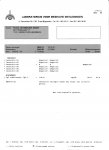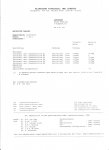Hip
Senior Member
- Messages
- 18,238
Do the number of coxsackievirus B and echovirus serotypes present relate to your CFS severity?
As many people know, Dr John Chia found that ARUP Lab is the only commercial lab in the US that provides antibody testing sensitive enough to measure the low levels of antibodies to coxsackievirus B and echovirus present in CFS patients.
If you have been tested for coxsackievirus B and/or echovirus at ARUP Lab, can you kindly post your ARUP Lab antibody titer results here (and any other viruses or other microbes that you have been tested positive for).
I would like to test the idea that the more coxsackievirus B and echovirus serotypes a person has in their body, the more severe their CFS might be.
So as well as the ARUP lab titers, could you also kindly indicate where you are on the Karnofsky scale (see below) in terms of your CFS severity, and state roughly the number of years you have had CFS.
Can you also indicate if you have any specific additional symptoms in your "portfolio" of CFS symptoms. For example, indicate if you have strong allergies or MCS (multiple chemical sensitivity), anxiety symptoms, anhedonia or depression, POTS (postural orthostatic tachycardia syndrome) or any other symptom that you feel specifically characterizes your own "brand" of CFS.
Karnofsky Scale (an index of disease severity)
100 Able to work. Normal; No complaints; No evidence of disease.
90 Able to work. Able to carry on normal activity; Minor symptoms.
80 Able to work. Normal activity with effort; Some symptoms.
70 Independent; not able to work. Cares for self; Unable to carry on normal activity.
60 Disabled; dependent. Requires occasional assistance; cares for most needs.
50 Moderately disabled; dependent. Requires considerable assistance and frequent care.
40 Severely disabled; dependent. Requires special care and assistance.
30 Severely disabled. Hospitalized, death not imminent.
20 Very sick. Active supportive treatment needed.
10 Fatal processes are rapidly progressing
As many people know, Dr John Chia found that ARUP Lab is the only commercial lab in the US that provides antibody testing sensitive enough to measure the low levels of antibodies to coxsackievirus B and echovirus present in CFS patients.
If you have been tested for coxsackievirus B and/or echovirus at ARUP Lab, can you kindly post your ARUP Lab antibody titer results here (and any other viruses or other microbes that you have been tested positive for).
I would like to test the idea that the more coxsackievirus B and echovirus serotypes a person has in their body, the more severe their CFS might be.
So as well as the ARUP lab titers, could you also kindly indicate where you are on the Karnofsky scale (see below) in terms of your CFS severity, and state roughly the number of years you have had CFS.
Can you also indicate if you have any specific additional symptoms in your "portfolio" of CFS symptoms. For example, indicate if you have strong allergies or MCS (multiple chemical sensitivity), anxiety symptoms, anhedonia or depression, POTS (postural orthostatic tachycardia syndrome) or any other symptom that you feel specifically characterizes your own "brand" of CFS.
Karnofsky Scale (an index of disease severity)
100 Able to work. Normal; No complaints; No evidence of disease.
90 Able to work. Able to carry on normal activity; Minor symptoms.
80 Able to work. Normal activity with effort; Some symptoms.
70 Independent; not able to work. Cares for self; Unable to carry on normal activity.
60 Disabled; dependent. Requires occasional assistance; cares for most needs.
50 Moderately disabled; dependent. Requires considerable assistance and frequent care.
40 Severely disabled; dependent. Requires special care and assistance.
30 Severely disabled. Hospitalized, death not imminent.
20 Very sick. Active supportive treatment needed.
10 Fatal processes are rapidly progressing


